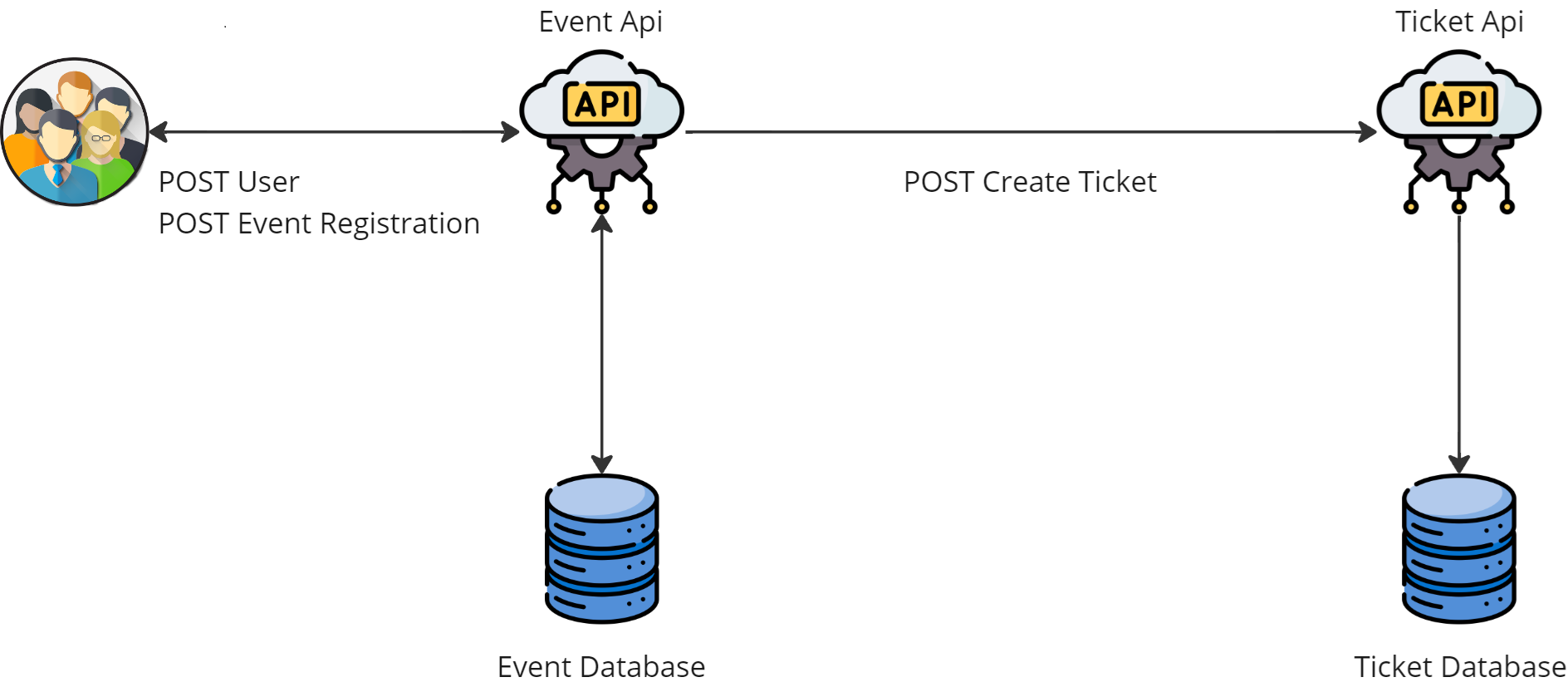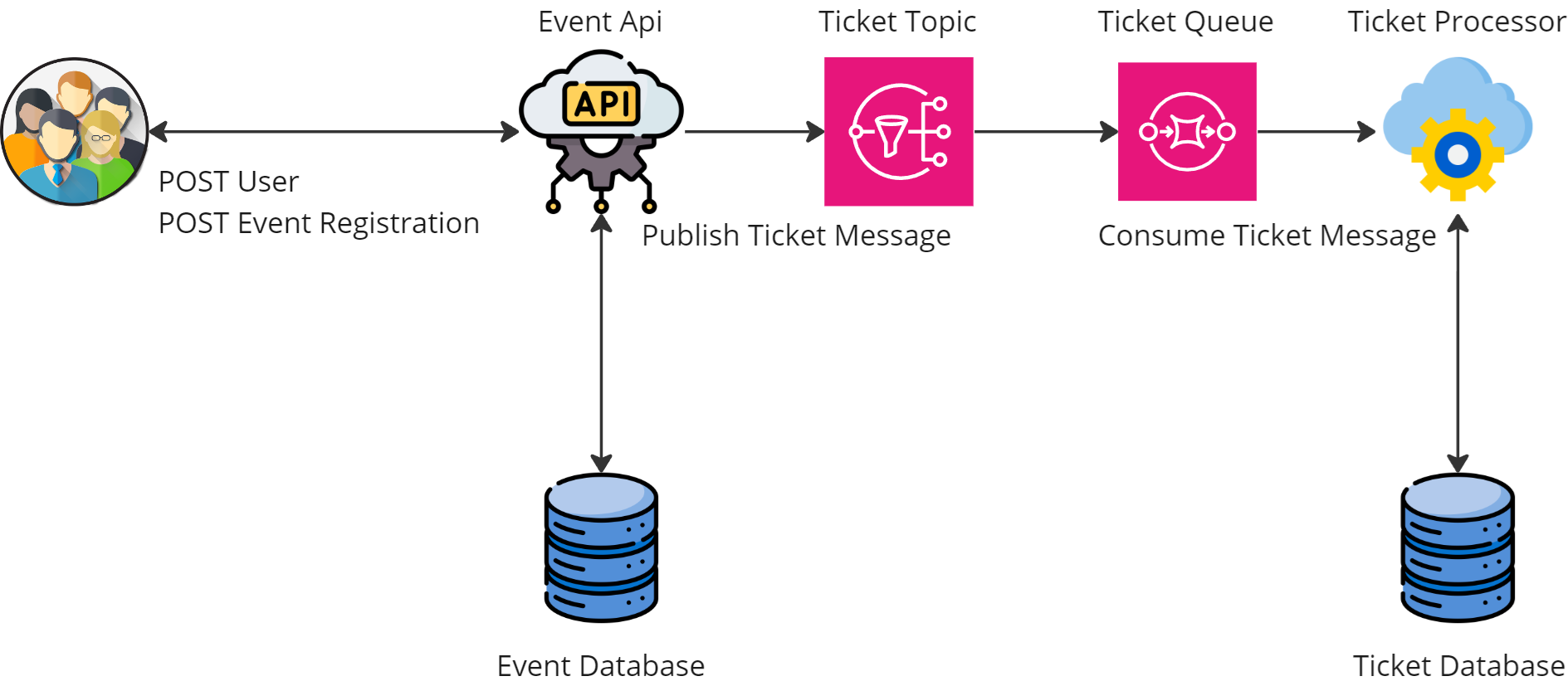This repository hosts the demonstration for the "Tracing the Future" presentation, scheduled for Devnot's .NET Conference 2024. The project showcases practical implementations of OpenTelemetry to improve observability within .NET applications as well as using Aspire with AWS and LocalStack for local development.
The demo includes two main scenarios: HTTP and SNS/SQS, highlighting synchronous and asynchronous communication between microservices.
This demo includes two main scenarios:
Demonstrates tracing a synchronous flow where services communicate directly over HTTP. This scenario highlights the real-time interactions between microservices.
Demonstrates asynchronous communication using AWS SNS for notifications and SQS for message queuing. This scenario highlights the decoupling of services and the benefits of message-based communication.
- OpenTelemetry.Demo.AspireHost: Aspire Host project automatically launches and configures all necessary .NET services along with Docker containers.
- OpenTelemetry.Demo.Local.Database: Responsible for creating the database and seeding it with initial data. It supports both MSSQL and PostgreSQL databases. See configuration section for more details.
- OpenTelemetry.Demo.EventApi: Manages user creation, event listing, and registration to events. Following a user registration, it initiates ticket creation requests either through direct HTTP calls or via SNS+SQS. See Interacting with the API and configuration sections for more details.
- OpenTelemetry.Demo.TicketApi: Processes ticket creation post-event registration when operating over HTTP. It receives ticket creation requests from EventApi and processes them accordingly.
- OpenTelemetry.Demo.TicketProcessor: Processes ticket creation post-event registration when operating over SNS+SQS. It listens to the SQS queue for ticket creation requests and processes them accordingly.
- Aspire: A cloud-ready stack for building observable, distributed applications in .NET.
- LocalStack: Provides a local development environment for AWS cloud stack, allowing for full functionality without requiring actual AWS services.
- OpenTelemetry: An open-source observability framework for cloud-native software, providing metrics, logs, and traces for applications.
- AWS.Messaging: Facilitates message processing with AWS services like SQS, SNS, and EventBridge.
- LocalStack.NET: A .NET client for LocalStack, offering a simplified wrapper for aws-sdk-net that configures endpoints to use LocalStack, facilitating local AWS cloud development.
- OneOf: Implements F# style discriminated unions in C#, simplifying complex conditional logic.
- Serilog.Sinks.OpenTelemetry: A Serilog sink transforms Serilog events into OpenTelemetry LogRecords and sends them to an OTLP (gRPC or HTTP) endpoint.
Follow these steps to set up the project locally:
Ensure the following prerequisites are met before proceeding with the local setup:
- .NET 8.0: Install from official .NET download page
- .NET Aspire: Requires the Aspire workload to be installed via Visual Studio or the .NET CLI. See .NET Aspire setup and tooling for more information.
- Container Runtime: An OCI-compliant container runtime like Docker Desktop or Podman is necessary. For more information, refer to the Container Runtime documentation.
- IDE or Code Editor: While optional, it's beneficial to use:
- Visual Studio 2022 version 17.10 or higher.
- Visual Studio Code.
- JetBrains Rider with the .NET Aspire plugin installed.
The OpenTelemetry.Demo.AspireHost is an Aspire Host project that launches and configures all necessary .NET services, including EventApi, TicketApi, and TicketProcessor, as well as essential containers for MSSQL, PostgreSQL, and LocalStack. Simply running this project is sufficient to initialize and operate the entire application environment.
In the launchSettings.json of the OpenTelemetry.Demo.AspireHost project, there are two key environment variables:
EventSystem:DatabaseType:Determines the type of database used, options include "npgsql" for PostgreSQL or "sqlserver" for Microsoft SQL Server.EventSystem:TicketIntegration:Specifies the communication strategy between EventApi and ticketing services. Set to "aws" to use AWS SNS and SQS, or "http" for direct HTTP calls.
The OpenTelemetry.Demo.AspireHost project can be run either directly through your IDE or via the command line:
- Open your IDE (Visual Studio, Visual Studio Code, JetBrains Rider, etc.).
- Navigate to the OpenTelemetry.Demo.AspireHost project.
- Start the project using the relevant IDE's run/debug functionality.
- Open a terminal and navigate to the
OpenTelemetry.Demo.AspireHostproject directory. - To run the application with HTTPS (requires configured developer certificates), execute:
dotnet run --launch-profile "https"If you encounter issues with HTTPS, ensure that your developer certificates are properly installed and configured. For more information, see dotnet-dev-certs.
- Alternatively, to run the application with HTTP
dotnet run --launch-profile "http"Once the services are up:
- The Aspire dashboard will be accessible, providing an overview of service health and metrics.
- You can also access the EventApi's Swagger UI to interact with the API directly. The URL to the Swagger UI will be displayed in the terminal or in the IDE's output window.
- Create Users:
- Use the
POST /userendpoint to create new users. This can be done via the Swagger UI or using a tool like Postman.
- Use the
- Register Users to Events:
- With users created, use the
POST /event/registerendpoint to register these users to events. Events are pre-seeded and available for registration.
- With users created, use the
- Access the Aspire dashboard to review logs, distributed traces, and metrics to gain insights into the application's performance and behavior.
- The dashboard provides a comprehensive view of the system's operations, making it easier to troubleshoot issues or understand the flow of data through your application.
- Ensure that all configurations in
launchSettings.jsonare set according to your local setup needs. - Experiment with different configurations to see how the system behaves under various conditions, especially when switching between database types or integration strategies.
To further enhance and expand this project, upcoming enhancements are planned as follows:
- Database Separation: Transition from a single database setup to distinct databases for users, events, and tickets to optimize architecture and scalability.
- Detailed Setup Instructions: Extend the setup guide to include Docker Compose and AWS CDK for more complex deployment scenarios.
- Observability Tools Integration: Add comprehensive examples and setup guidance for tools like Jaeger, Prometheus, and Zipkin.
Additionally, the localstack-dotnet organization will develop more extensive example projects that leverage technologies such as Aspire, OpenTelemetry, AWS, and LocalStack.NET.
Contributions to this project are welcome! Feel free to submit issues or pull requests to improve the project.
This project is released under the MIT License

